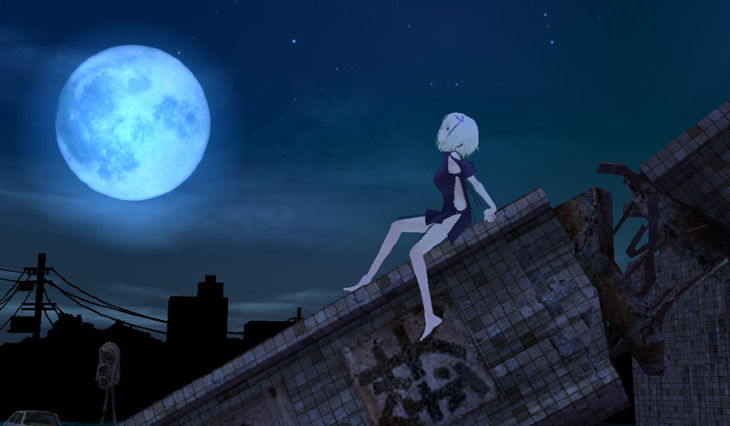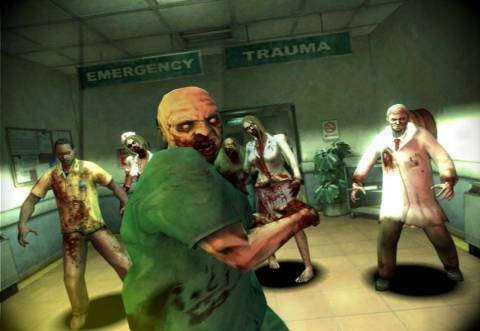Instead of simply picking and choosing a GOTY list from the fraction of games I played this year, I'd like to do something a little different and nominate what I thought the central issue in the gaming world was. And the winner is "To what extent are games art?" Although this is a question that has haunted the medium of late, it seems like in 2010 almost everyone was talking about the subject, thanks in so small part to the efforts (ie. trolling) of Roger Ebert. Perhaps we will look back on this year and see it as a turning point after which game developers started to seriously consider their work as contextually determined cultural products taking part in a broader media ecology? Or not, probably not.
At present I see possibly five areas where development of games as an "art" form may occur: the haphazard development of the traditional games industry, self-consciously adult games that target that demographic through the exploration of more mature subject matter (for ex. Heavy Rain as it is aimed at an older audience but not independently developed), and indie games. For the sake of completeness I'll mention motion controls and the iPad/iPhone cottage industry, but I'm not qualified to discuss them in any detail: I only own the Wii and not the Kinect or Move, and I do not own an iPad/iPhone. If anyone plays games on those platforms I'd be interested to hear your thoughts.
1. Traditional Games Industry
It is difficult to say anything decisive about the games industry as such because the field of video games covers everything from rather abstract and traditional rule-bound games (such as Tetris) to games which invest a great deal in their storytelling (adventure games, etc.). Commonly, games are dismissed or demeaned as an artform because of their typically shallow and derivative plots, stereotypical characters, and lack of socially acceptable messages. However, the assumption is that (a) games are a medium to be judged by the standards of other narrative mediums and only as narratives (b) all games are to be judged by the same standard. However, it seems clear to me that games differ wildly in the extent to which they rely on narrative, and not only that, but the way that they utilise narrative is medium-specific. One way they can do this is through interactive storytelling, ie. games that make meaning primarily through interaction with the world - Half-Life, Shadow of the Colossus, Silent Hill 2 and Shattered Memories, etc. I think this is a particularly good way to mediate the tension between games and their stories, but it's not the only way. The most common method is to utilise genre conventions and cliches, a condensed narrative, to minimise the time spent not playing the game. Although everyone hates on conventions and cliches, for video games this is not always a bad thing. If done cleverly or humorously this can be as effective a means of telling a story and shaping the gameplay experience as a verbose and more developed narrative, just as "lower class" speech can communicate meaning as effectively as the Queen's English. Moreover, this gives game writers the opportunity to indulge in mockery of the pretentious aspirations of mediums that sacrifice fun for deadly seriousness: for best effect this should be paired with cynicism and parodic exaggeration, such as House of the Dead: Overkill or the Dead Rising series. The way Bulletstorm is being marketed is another example.
If we accept this then we can move on from misguidedly trying to emulate the narrative approaches of other mediums in video game form. Forget Metal Gear Solid, Uncharted, etc. They're not necessarily bad stories, they may even be far above the vg average, but that approach is simply the wrong one to have. Trying to make me identify with and pay attention to the story of an all-American Nolan North brotagonist when he spends the entire game stealing shit and slaughtering the natives is a patent absurdity. Same with simulating the thrill of warfare when your whole franchise is about the evils of war. Empathy and emotional identification (the raison d'etre of narrative cinema) are self-defeating emotions to invoke when married to arbitrary, amoral shooter or action mechanics. Although it's common to hate on Rockstar and their protagonists, at least they are honest about their characters being broken, evil, or disturbed sociopaths, putting to one side GTA IV and Red Dead Redemption.
Perhaps if we're talking about 'art' as simply some kind of seal of quality, then the games that are that are the most fun, the most polished in terms of mechanics and execution, are worthy of being called art. I'm inclined to adopt this standard for games that are of a high level of quality but are cynicial or indifferent to their narratives. I used to have the view that games with underdeveloped narratives, such as Gears of War, could only be enjoyed with a bad conscience, but this is an extremely perverse point of view to have as a gamer; one I've managed to work through with the help of curbstomping and chainsaw executions.
In summary,
*Games have a variety of ways to tell stories; they should tell them in ways that work for video games and not other media, obv.
*The traditional games industry hasn't done such a bad job of producing art. We've seen significant strides in video-game storytelling, as well as mechanically excellent games, and sometimes both.
*Cliches, conventions, and other forms of shorthand storytelling are an efficient way of telling a story, a developed narrative isn't always appropriate or necessary.
2. The 'Adult' Game
This will be short because I can only think of one example at the moment: Heavy Rain. Although this comes from the big-budget games industry, it is clearly targeting a different demographic, aiming to provide a new kind of experience and deal with more mature subject matter. There's a lot of pretentious bullshit surrounding this game, such as it being an 'interactive drama'. Basically, the mechanics are sufficiently simplified and minimised that an adult casual might feel comfortable buying this game (not that there's anything wrong with that), although really this is just another display of bad conscience about video games. If you're going to appeal to a casual audience, then you try to minimise the gaming aspect as much as possible, which is a disservice to the people who are going to buy your game (mostly gamers I'm going to assume). Just be honest about which market you're trying to appeal to and that you're making a video game instead of something never seen before. Games trying to be films is nothing new, mature video games have been around a long time as well. Still, there is a place for games like this, and there were moments where I thought Heavy Rain was brilliant: the mechanics and narrative come together to actually give a sense of weight and moral gravity to decisions. While it didn't necessarily succeed as a story, it did at least in part achieve its goals. Divested of pretentiousness, I'd like to see games with greater maturity and ambition.
*Stop being pretentious, David Cage.
*Nothing here is new as such, but these kinds of games do need to have more of a presence in the industry.
3. Indie Games
Indie games have also done their part to generate a lot of discussion about what makes an art game. I will look at a few ways indie games have explored the relationship of gaming and art.
A) Conceptual art
Games like Braid which are organised thematically. Although it's a brilliant puzzle-platformer, the storyline is poorly integrated and, except for the excellent ending and the thematic aspects, poorly told. Although I could appreciate what Braid was trying to do, I find conceptual art in general insufferable and a very poor fit for video games.
B) Game-art
As an example, the company Tale of Tales trying to use games as a form of traditional artistic expression. But games are their own form of artistic expression and they're doing just fine! Although I agree with their stance on the value of interactive storytelling and the worthlessness of conceptual art, their games haven't backed up their statements particularly well. What they do has been done better elsewhere.
C) The pastiche
Games that knowingly refer to gaming history and add in novel twists or combinations, such as Super Meat Boy and its radicalised platforming aesthetic. I think this is the most promising area of indie game development, and the one I'm most excited about, because rather than attempting to justify gaming through the importation of standards from other mediums or vague invocations of Art these games are based on the invocation and appreciation of the gaming medium.
4&5: ??? Giantbomb, you tell me.
If you've stuck with me this far, thanks for reading. Hope you had a good year in gaming.



Log in to comment